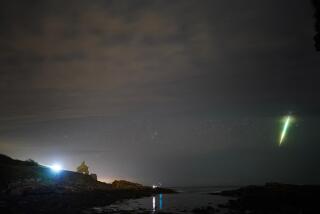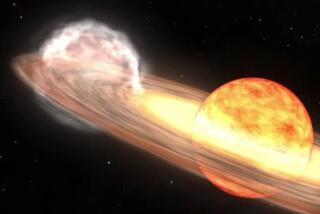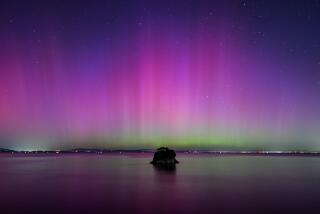Northern lights may make rare appearance in parts of U.S.

Parts of the Midwest, including Illinois and Iowa, could be treated to a dramatic show of colored lights in the sky Thursday and Friday nights.
A solar storm may cast colored lights – known as the Aurora Borealis or Northern lights – in the sky over parts of the northern Plains, the Great Lakes region and Northeast on Thursday and Friday, forecasters say.
“It’s a very rare occurrence,” Joe Kunches of the National Oceanic and Atmospheric Administration’s Space Weather Prediction Center in Boulder, Colo., told the Los Angeles Times.
It may be only be visible for five or 10 minutes, most likely as far south as Colorado, Illinois and Iowa and potentially from Chicago, Boston, Cleveland, Seattle and Des Moines.
MORE: How to see the Northern lights
The time, location and duration of an appearance is a calculated guess. “We really don’t have the ability to say when it comes to forecasting the aurora,” Kunches said.
The cause, however, is clear.
“Basically, on late Tuesday, there was a strong eruption at the sun that was caused by strong magnetic fields,” Kunches said. “Part of that eruption was at a cloud, which got blown off.”
The eruption shook Earth’s magnetic field and expanded the Aurora Borealis south, possibly as far south as Colorado and central Illinois.
MORE: How to see the Northern lights
Kunches likened the eruption to a foul ball at a baseball game.
“There is a directional component to it,” he said. “It really matters where you are.”
In this case, the cloud – like a foul ball at a baseball game – is “coming our way.”
He said best viewing would probably be Thursday around midnight in all regions, weather permitting.
Normally, “the Northern lights mostly appear at the very northern or southern latitudes because that’s where the magnetic fields of Earth come through the atmosphere,” Andrew West, a Boston University professor in the department of astronomy, told The Times in an email.
“Following large solar flares where huge amounts of particles are sent into the solar system, we can often see auroras and sometimes at mid-latitudes.”
Dr. William Paterson of NASA’s Department of Atmospheric and Planetary Sciences, said that the aurora is visible in these areas “a couple of times a decade.”
Back in 2004, Paterson said the Northern lights were visible as far south as Virginia. But the magnitude of this geomagnetic solar storm is hard to predict.
“Exactly how dramatic the storm is going to be, we can’t tell,” Paterson said. “But it is within the realm of possibilities that the Northern lights are going to be seen pretty far south.”
Kunches said if the storm isn’t as severe as forecasters are predicting, the Northern lights may only make its way to the U.S.-Canada border.
The name “aurora borealis” means “dawn of the north.” In Roman myth, Aurora was the goddess of the dawn, according to the Canada-based Northern Lights Centre website.
Colors in the aurora – which can be shades of red, yellow, green, blue – “are produced when certain elements in the atmosphere – mostly oxygen or nitrogen – are excited by the charged particles,” West said.
But there are some downsides to the colorful display.
NASA had to delay a launch Wednesday because officials were worried about the effects of the solar flare, Paterson said.
High-frequency radio communications, GPS systems and satellite operations of various types are usually down during solar storms, Kunches said.
“However, not to worry,” he said. “Mother Nature is doing what Mother Nature will do and we are ready for it.”
Space Weather Center’s Aurora Forecast is mapping the “probability of visible aurora” online. The University of Alaska’s Geophysical Institute has a similar forecast posted on its website.
ALSO:
How to watch the Northern lights
Tucson honors ex-Rep. Gabrielle Giffords, fellow shooting victims
Two dead, one missing as Navy helicopter crashes off Virginia coast
Twitter: @saba_h
More to Read
Sign up for Essential California
The most important California stories and recommendations in your inbox every morning.
You may occasionally receive promotional content from the Los Angeles Times.











